
"You'll Never Find Another Love Like Mine" is a song written by Kenny Gamble and Leon Huff and performed by R&B singer Lou Rawls on his 1976 album All Things in Time. The song proved to be Rawls' breakthrough hit, reaching number 1 on both the R&B and Easy Listening charts as well as number 4 on the dance chart and number 2 on the US Billboard Hot 100. This was the first and only time that one of Rawls' records reached Billboard's pop Top Ten.

"Home Ain't Where His Heart Is (Anymore)" is a song co-written and recorded by Canadian country music artist Shania Twain. It was released on July 24, 1996 as the seventh single from her second studio album The Woman in Me. It was written by Twain and her then-husband Robert John "Mutt" Lange. It also serves as the opening track to The Woman in Me.

"Then Came You" is a 1974 song recorded by American soul singer Dionne Warwick and American R&B group The Spinners. It was credited to Dionne Warwicke and the Spinners. The track was written by Sherman Marshall and Phillip T. Pugh, and produced by Thom Bell.
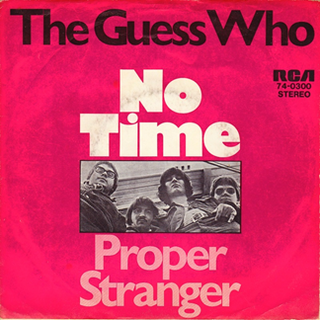
"No Time" is a song by Canadian rock band The Guess Who, composed by guitarist Randy Bachman and lead singer Burton Cummings.
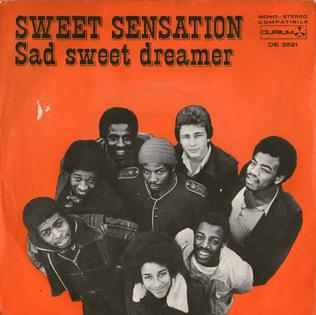
"Sad Sweet Dreamer" is a song by Sweet Sensation, which was a number-one single on the UK Singles Chart for one week in October 1974.

"Oh Happy Day" is a 1967 gospel music arrangement of the 1755 hymn by clergyman Philip Doddridge. Recorded by the Edwin Hawkins Singers, it became an international hit in 1969, reaching No. 4 on the US Singles Chart, No. 1 in France, Germany, and the Netherlands and No. 2 on the Canadian Singles Chart, UK Singles Chart, and Irish Singles Chart. It has since become a gospel music standard, selling over 7 million copies worldwide, making it the second best-selling gospel song of all time.

"Baby, What a Big Surprise" is a ballad written by Chicago's then bassist/singer Peter Cetera, which appeared on their album Chicago XI (1977), with Cetera singing lead vocals. The first single released from the album reached number 4 on the US Billboard Hot 100 chart.

"My Side of the Bed" is a song by American singer-songwriter Susanna Hoffs, released in December 1990 by Columbia as the lead single from her debut solo album, When You're a Boy (1991). It was written by Hoffs, Tom Kelly and Billy Steinberg, and produced by David Kahne. "My Side of the Bed" reached No. 30 on the Billboard Hot 100, her highest-charting single.

"Time Passages" is a song by British singer-songwriter Al Stewart, released as a single in 1978. It was produced by Alan Parsons and is the title track of Stewart's 1978 album release. The single reached No. 7 on the Billboard Hot 100 chart in December 1978, and also spent ten weeks at No. 1 on the U.S. Billboard Easy Listening chart, the longest stay at number one on this chart in the 1970s. Billboard magazine also ranked "Time Passages" as the No. 1 Adult Contemporary single of 1979.
The Guess Who was a Canadian rock band, originating as The Guess Who? in 1966, and adopting the name The Guess Who in 1968. Formed as a garage rock band, their best-known works are in the pop rock and psychedelic rock genres.

"I Woke Up in Love This Morning" is a song written by L. Russell Brown and Irwin Levine and recorded by The Partridge Family for their 1971 album, Sound Magazine. It went to number 13 on the Billboard Hot 100 in 1971; it hit number 4 in Canada.

"This Girl Is a Woman Now" is a song written by Victor Millrose and Alan Bernstein and was recorded by Gary Puckett & The Union Gap for their 1969 album The New Gary Puckett and the Union Gap Album.

"Get Closer" is a song by American soft rock duo Seals and Crofts, released as a single in 1976. It is the title track of their eighth studio album, Get Closer and reached No. 6 on the Billboard Hot 100 and No. 2 on the Adult Contemporary chart. Billboard ranked it as the No. 16 song of 1976.
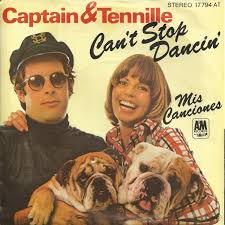
"Can't Stop Dancin" is a song written by John Pritchard Jr. and Ray Stevens, which became a Top 40 hit for Captain and Tennille in early 1977. It was the first single released from their third studio album, Come In from the Rain.
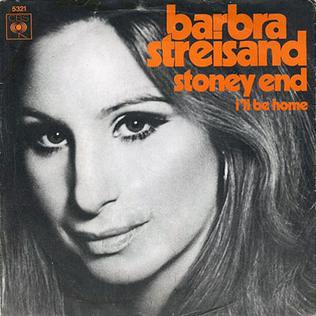
"Stoney End" is a song written by Laura Nyro and released in February 1967 on her debut album More Than a New Discovery. According to childhood friend Alan Merrill, Nyro originally intended the song, a gospel-inflected uptempo piece, to be performed at a slower pace. The best known recording of Nyro's album version of the song was a hit for Barbra Streisand in 1970.

"It Don't Matter to Me" is a song written by David Gates and originally recorded by the pop-rock group Bread, of which Gates was a member. It was a Top 10 hit in the U.S. and Canada. In the U.S., it reached No.10 on the Billboard Hot 100 and No.7 on the Cash Box Top 100. In Canada, "It Doesn't Matter to Me" spent two weeks at No.6, and is ranked as the 81st biggest hit of 1970.
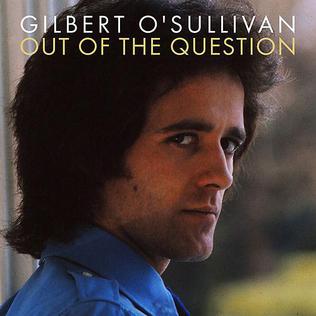
"Out of the Question" is a popular song by Irish singer Gilbert O'Sullivan. It was written by O'Sullivan and produced by Gordon Mills.
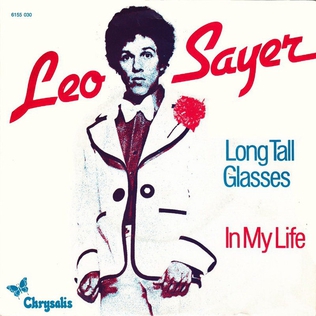
"Long Tall Glasses (I Can Dance)" is a 1974 song by Leo Sayer, co-written with David Courtney. It was released in the United Kingdom in late 1974, becoming Sayer's third hit record on both the British and Irish singles charts and reaching number four in both nations. It was included on Sayer's album Just a Boy.

"Smile a Little Smile for Me" is the debut single by the Flying Machine. The song was written by Geoff Stephens and Tony Macaulay.
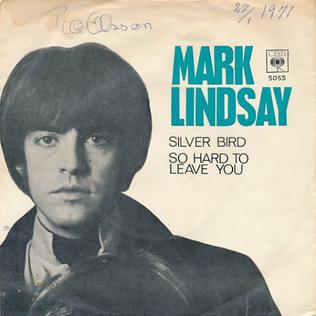
"Silver Bird" is a song written by Kenny Young and Artie Butler and recorded by Mark Lindsay, in his solo career after Paul Revere and the Raiders.



















